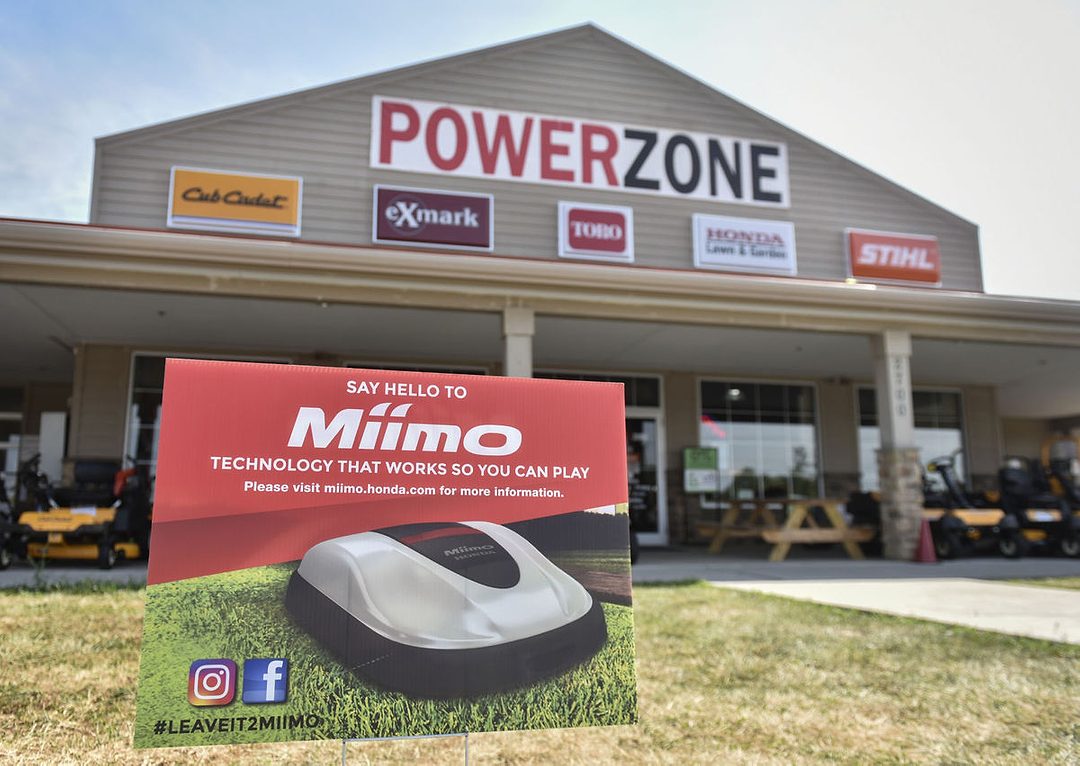Honda’s new robotic lawn mower buzzed around a patch of grass at Power Zone in Christiansburg, Va., the only store in Virginia where the device is sold as part of a limited U.S. launch.
“Is it cutting the grass?” a skeptical passerby asked, adding as he walked away that it’s just the latest sign of our increasing laziness.
Power Zone president Jim Higham admits the so-called Miimo is still foreign to Americans, but he said he believes the idea of putting a robot in charge of lawn care will eventually make the cut, according to an article in The Roanoke Times.
Honda started small this year with 44 dealers carrying the product in select markets in order to gauge interest and collect customer feedback, according to Honda Power Equipment spokeswoman Kathy Graham. The company is planning a nationwide rollout next year, but for now Power Zone is alone in the state.
Higham said he knows it’s not for everybody, but he didn’t want to miss the chance to get in early on a piece of technology he thinks will one day reshape the industry.
Manufacturers began selling the autonomous devices in Europe, but now they’re becoming increasingly available in U.S. markets as well.
Sweden-based Husqvarna now sells an American version of its Automower. Cub Cadet’s parent company merged with Israel’s Robomow in July, announcing plans for a new line of U.S. robots.
“You’ve got to be on top of technology. Robotics are a reality in our industry,” Higham said. “All the manufacturers are working on it.”
The Miimo does have its drawbacks, most notably a $2,500 price tag. But Higham notes during his sales pitch that it comes out to about $70 per month on an interest free, three-year loan.
Hiring a lawn care company is often more expensive, so he said he believes some customers will see it as a good investment in order to avoid the hassle.
Power Zone has a demo running both inside the store and outside, so shoppers can see the Miimo in action. Miimo has small razors under the hood that cut just a sliver off the top with every pass. Instead of letting grass grow for a week and then cutting it all at once, the autonomous mower is in a constant state of maintenance, trimming ever so slightly so it never needs a major cut.
“It’s like if you went and got a haircut every two days,” Higham said. “Your hair would always be the same length. The barber would have a hard time taking hair off – but they would. It grows a little bit every day.”
Since there’s no gas motor, the Miimo is about as loud as a golf cart. It also doesn’t make striping patterns like traditional mowers. When Power Zone sells a unit, they’ll tack on installation costs in order to bury an underground boundary wire around the owner’s yard and any flower beds that need to be avoided. The Miimo then bumps around inside the wire, randomly zig-zagging back and forth across the property.
When in continuous operation mode, the mower will cut for one hour and then drive itself back to a docking station to recharge for an hour. Then it will mow for an hour, then charge again.
The owner can program schedules so it only runs for however long it takes to maintain each individual yard. A single Miimo can handle up to three quarters of an acre of grass.
The machine is water resistant and is able to withstand rain. It’s also loaded with safety features, like an automatic kill switch if it senses anything under the hood near the blades. Whenever it bumps into something, the Miimo just backs up, changes direction and then continues on, much like the robotic vacuum cleaners that have been buzzing around homes in the U.S. for years.
The mower has limitations beyond just the price, which is more than an average high-end riding mower. The tallest grass setting is three inches, which is shorter than many people like to keep their yards during hot summer months.
Higham also said he doesn’t make any claims about maintenance costs or life span, since he hasn’t watched one mature for years yet. But he does point out they’re sold with a Honda warranty.
For now, Power Zone salespeople are spending more time explaining the product than selling it. But Higham said that’s all part of carrying something so novel. He can imagine all sorts of potential customers, from those with small yards in senior living communities to landlords looking to maintain all their properties.
“It’s the beginning,” Higham said. “The concept of robotics will be in place on all of our mowers, I suspect, in 20 or 30 years.”





